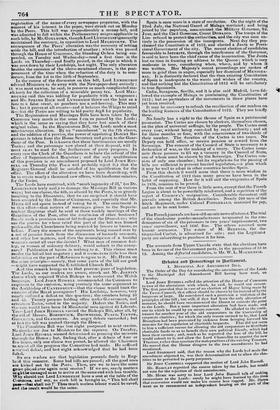Spain is once more in a state of revolution. On
the night of the 22nd July, the National Guard of Malaga mutinied; and being joined-by the populace., assassinated the Military Governor, Sr. JUST, and the Civil Governor, Count DONA DIO. The troops of the Line refused to proteathe uuthorities. and the city was soon en- tirely in the possession of the insurgents. Next day they pro- claimed the Constitution of 1812, and elected a Junta or Provi- sional Government of the city. The recent election of candidates favourable to Imam, through the interference of the Governor, is said to have been the chief cause of the insurrection. The Junta lost no time in framing an address to the Queen ; which is very moderate in tone, considering when, wile's., and by whom it was written. Her Majesty's recent proceedings are spoken of more in grief than in anger, especially her dismissal of Mesunza- BAL. It is distinctly declared that the then existing Constitution of Spain is inadequate to the wants and wishes of the country, and that nothing but the Constitution of 1812 will be satisfactory to true Spaniards.
Cadiz. Saragossa, Seville, and it is also said Madrid, haveifol- 1 Ill lowed the example of Malaga in proclaiming the Constitution of 1812; but no particulars of the movements in those places have yet been received. It may be necessary to refresh the recollection of our readers on the leading features of the Constitution of 1812. They are briefly these.
No family has a right to the throne of Spain as a patrimonial possession. The Cortes are chosen by electors, themselves chosen, on the plan of universal suffrage, by the people. The Cortes meet • every year, without being convoked by royal authority ; and sit for three months or four, with the concurrence of two-thirds of their number. The duration of the Cortes is two years. No Deputy can hold office, or receive pension or reward from the Sovereign. The consent of the Council of State is necessary to a declaration of war, or the making of a treaty. The Cortes nomi- nate three persons to fill up a vacancy in the Council of State, one of whom must be chosen by the Sovereign. The Cortes con- sists of only one chamber; but its regulations for the passing of bills are sufficient to prevent hurried legislation,—a plan which it may be well to adopt in other countries besides Spain.
From this sketch it would seem that there is more wisdom in the Constitution of 1812 than many persons have been in the habit of supposing. How far it will suit the exigencies of Spain in 1836, remains to be preyed. From the seat of war there is little news, except that the French Legion is about to be powerfully reinforced, and a repetition of the report of CORDOVA'S resignation. Considerable discontent still prevails among the British Auxiliaries. Nearly 200 men of the Sixth Regiment, under Colonel FITZGERALD. mutinied for pay, and are to be sent home.


























 Previous page
Previous page